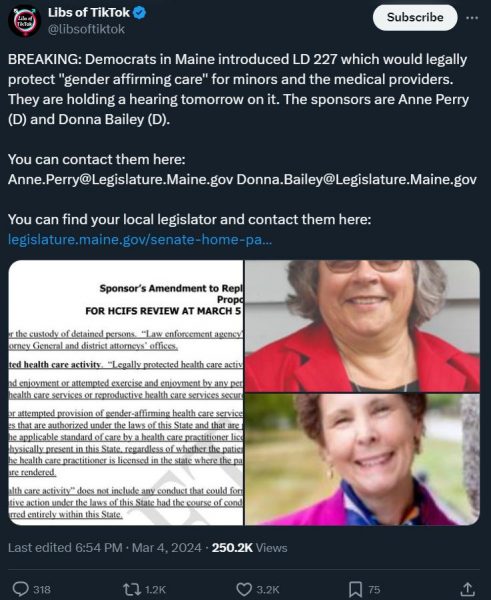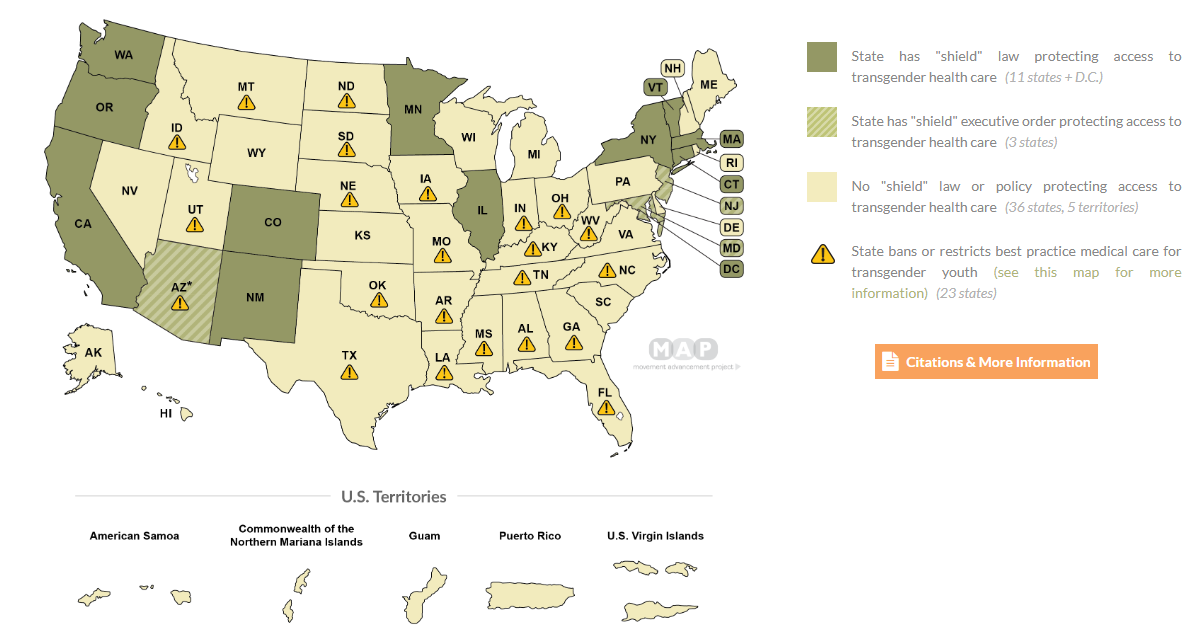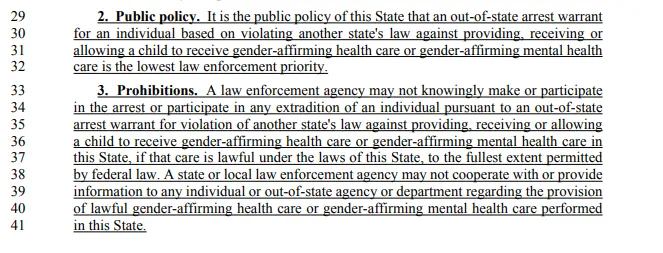Maine
Victory Fund honors Maine House speaker in D.C.
Ryan Fecteau is gay Catholic University alum

WASHINGTON — The Victory Fund on Saturday honored Maine House Speaker Ryan Fecteau on the last day of its International LGBTQ Leaders Conference in D.C.
Fecteau — an openly gay Catholic University of America alum — won a seat in the Maine House of Representatives in 2014. He became the chamber’s speaker in 2020.
“Hate and intolerance will not derail us,” said Fecteau after Florida state Rep. Carlos Guillermo Smith presented him with the Tammy Baldwin Breakthrough Award, which is named after U.S. Sen. Tammy Baldwin (D-Wis.). “Our community will not be intimidated.”
The Victory Fund on Friday honored Guatemalan Congressman Aldo Dávila, a gay man who is living with HIV. The organization at its 30th anniversary gala on Saturday honored former Massachusetts Congressman Barney Frank, Oregon Gov. Kate Brown, Minneapolis City Council Vice President Andrea Jenkins and former Irish Prime Minister Leo Varadkar.
Maine
Hundreds pack Portland, Maine for annual Pride parade
The city of Portland held it’s annual Pride parade and festival on Saturday, with hundreds turning out to celebrate LGBTQ+ rights

By Lauren McCauley | PORTLAND, Maine – The city of Portland held it’s annual Pride parade and festival on Saturday, with hundreds turning out to celebrate LGBTQ+ rights.
Pride month is observed throughout June, with parades, festivals, drag shows and other events across much of Maine. Photographer Jim Neuger captured some of the parade’s participants and onlookers as the marchers wove their way down Congress Street, culminating at the festival in Deering Oaks Park.

Marchers carry a 900-foot flag down Congress Street at the end of the Portland Pride Parade. June 15, 2024. Photo: Jim Neuger

Participants in the Portland Pride Parade head down Congress Street. June 15, 2024. Photo: Jim Neuger

A participant in the Portland Pride Parade on Congress Street. June 15, 2024. Photo: Jim Neuger

A participant in the Portland Pride Parade on Congress Street. June 15, 2024. Photo: Jim Neuger

A participant in the Portland Pride Parade on Congress Street. June 15, 2024. Photo: Jim Neuger

Participants in the Portland Pride Parade head down Congress Street. June 15, 2024. Photo: Jim Neuger

A Portland school system bus heads down Congress Street during the Portland Pride Parade. June 15, 2024. Photo: Jim Neuger

Participants in the Portland Pride Parade ride a trolly car down Congress Street. June 15, 2024. Photo: Jim Neuger

Participants in the Portland Pride Parade on Congress Street. June 15, 2024. Photo: Jim Neuger

A participant in the Portland Pride Parade on Congress Street. June 15, 2024. Photo: Jim Neuger

Participants in the Portland Pride Parade on Congress Street. June 15, 2024. Photo: Jim Neuger

A man watches the Portland Pride Parade from a second-story window above Reny’s department store on Congress Street. June 15, 2024. Photo: Jim Neuger

Participants in the Portland Pride Parade on Congress Street. June 15, 2024. Photo: Jim Neuger

Spectators watch the Portland Pride Parade on Congress Street. June 15, 2024. Photo: Jim Neuger

Members of the Portland Dance Collective perform during the Portland Pride Parade on Congress Street. June 15, 2024. Photo: Jim Neuger

A participant in the Portland Pride Parade on Congress Street. June 15, 2024. Photo: Jim Neuger

Portland Pride Parade heads down Congress Street. [These may be the grand marshals; need to check names.] June 15, 2024. Photo: Jim Neuger

A member of the Dykes on Bikes motorcyhcle group leads the Portland Pride Parade down Congress Street. June 15, 2024. Photo: Jim Neuger

Rylee Knight twirls a flag before marching in the Portland Pride Paradeon Congress Street. June 15, 2024. Photo: Jim Neuger
In a state that led the way in the fight for same-sex marriage — becoming the first to pass a law by statewide referendum in 2012 — many participants this year focused on the need to protect the rights of trans people, who have become the target of a nationwide, right-wing backlash.
On Tuesday, some of the movement’s pioneers held a conversation at the Equality Community Center in Portland, during which they reflected on some of the lessons they learned over the years and discussed how they could help guide future efforts to protect and advance equal rights.
******************************************************************************************

Lauren McCauley is the editor of Maine Morning Star. She has covered politics and policy in Maine for more than 10 years and is the former editor of Maine Beacon.
******************************************************************************************
The preceding article was previously published by the Maine Morning Star and is republished with permission.
Maine Morning Star is an independent, nonprofit and nonpartisan news site covering state policy and politics — and how they impact the lives of Maine people. We aim to hold powerful people and institutions accountable and explain how their actions affect communities from Kennebunk to Caribou.
We’re part of States Newsroom, the nation’s largest state-focused nonprofit news organization.
Maine
Maine Democrats double down support of abortion, LGBTQ rights
The presentation and adoption of the Maine Democrats’ core values comes after Maine Republicans unveiled their platform in late April

By Evan Popp | BANGOR, Me. – Maine Democrats unveiled and adopted their 2024 party platform over the weekend, pledging to safeguard democracy, defend reproductive health rights, push for more affordable housing and combat the growing threat of climate change, among other stances.
The platform was presented at the party’s convention in Bangor, where participants heard from political leaders and mobilized supporters for the upcoming 2024 election cycle.
The party agreed to six amendments to the platform on issues ranging from tribal sovereignty, substance use and prison reform. However, Democrats opted against 11 other proposed alterations, including a provision that called for ending U.S. aid to Israel until that country declares a permanent ceasefire in Gaza and withdraws from Palestinian territory.
Several Maine-based organizations demonstrated at the party’s convention Friday in protest of the U.S.’ backing of Israel’s war in Gaza.
In their finalized platform, Maine Democrats include a range of political and policy principles. One emphasis is the need to protect democracy. Within that section, the platform states that “insurrection is disqualifying,” a reference to President Donald Trump and the Jan. 6 assault on the U.S. Capitol in which his supporters attempted to overturn the results of the 2020 election.
The platform also states that it is “our duty to condemn and prosecute those willing to storm the halls of Congress by force or who otherwise disrupt that transfer of power.”
On the subject of elections, Maine Democrats also back universal voting rights and fair electoral districts free from political gerrymandering.
Another focus is constitutional rights for women, including the right to reproductive freedom — a major emphasis for Democrats around the country following the overturning of Roe v. Wade in 2022. The party platform states that amendments should be passed to the state and national constitutions “to prevent governmental interference with any individual’s decision relative to their own reproductive health.”
The party’s platform also cites the need to pass the Equal Rights Amendment, eliminate gender pay gaps, and end violence against women.
On health policy, the state party says it supports universal health care, gender-affirming care, increasing rural access to services, and an expansion of public health programs.
As amended, the platform also recognizes substance use disorder as a health crisis and states that Democrats “unequivocally support expanded access to evidence-based treatment and assistance for recovery which includes but is not limited to harm reduction.”
When it comes to housing affordability, a major challenge facing the state, Democrats say they will work to guarantee that “no Mainer will die from a lack of secure, safe, and affordable housing.” That means advocating for affordable housing development along with tenant protections and preventing homelessness through supporting the housing first model, among other policies.
Another significant issue is climate change, which the party says poses an existential threat to the state. The platform pledges Democrats’ support for the implementation and continual improvement of Maine’s climate action plan, green energy expansion and transforming transportation to make it more sustainable. The party also states that Maine should seek energy independence, create a diverse renewable energy apparatus, protect the state’s natural resources and safeguard against storm damage.
The party platform addresses the issue of education as well, saying that Democrats support safe and inclusive schools and “comprehensive teaching and discussion of all subjects in a course of study guided by informed educators and uncorrupted by political agendas” — a likely reference to the increased right-wing pushback against public school curriculums.
However, two education-related amendments failed to pass. One proposed for the party to ensure all Mainers have access to “affordable, low-cost, or free higher education, including four-year colleges, community colleges, and technical schools.” The other proposal called for the continuation of a program providing two years of free community college to Maine graduates and support for efforts to reduce the debt burden on Maine students.
The platform outlines a number of other core values, including welcoming immigrants, supporting racial justice, backing LGBTQ rights, pushing for fair sentencing and alternatives to incarceration — including in the juvenile justice system — and recognizing tribal sovereignty (a plank that was amended slightly to explicitly recognize the sovereignty of the Wabanaki Nations).
Along with those tenets, the platform contains many other principles, such as support for labor rights and equitable wages and helping veterans and older Mainers. However, a proposed amendment to the veterans section that would have acknowledged the sizeable portion of Maine veteran suicides that take place with firearms and sought to support firearm safety and suicide prevention efforts was not adopted.
The presentation and adoption of the Maine Democrats’ core values comes after Maine Republicans unveiled their platform in late April. The Maine GOP platform included a wide range of conservative stances, such as provisions opposing gender-based education, abortion and marriage equality and pushing to create more stringent requirements for voting.
Emma Davis contributed to this report.
******************************************************************************************

Evan Popp studied journalism at Ithaca College. He joins Maine Morning Star following three years at Maine Beacon writing about statewide politics. Before that, he worked for the Santa Fe New Mexican newspaper and interned at the Progressive magazine, ThinkProgress and the Reporters Committee for Freedom of the Press.
******************************************************************************************
The preceding article was previously published by the Maine Morning Star and is republished with permission.
Maine Morning Star is an independent, nonprofit and nonpartisan news site covering state policy and politics — and how they impact the lives of Maine people. We aim to hold powerful people and institutions accountable and explain how their actions affect communities from Kennebunk to Caribou.
We’re part of States Newsroom, the nation’s largest state-focused nonprofit news organization.
Maine
Maine’s Governor Mills signs trans & abortion sanctuary bill into law
Despite a series of bomb threats against legislators in the state, Gov. Janet Mills has signed a trans & abortion sanctuary bill

By Erin Reed | AUGUSTA, Maine – On Tuesday, Gov. Janet Mills of Maine signed LD 227, a sanctuary bill that protects transgender and abortion providers and patients from out-of-state prosecution, into law.
With this action, Maine becomes the 16th state to explicitly protect transgender and abortion care in state law from prosecution. This follows several bomb threats targeting state legislators after social media attacks from far-right anti-trans influencers such as Riley Gaines and Chaya Raichik of Libs of TikTok.
An earlier version of the bill failed in committee after similar attacks in January. Undeterred, Democrats reconvened and added additional protections to the bill before it was passed into law.
The law is extensive. It asserts that gender-affirming care and reproductive health care are “legal rights” in Maine. It states that criminal and civil actions against providers and patients are not enforceable if the provision or access to that care occurred within Maine’s borders, asserting jurisdiction over those matters.
It bars cooperation with out-of-state subpoenas and arrest warrants for gender-affirming care and abortion that happen within the state. It even protects doctors who provide gender-affirming care and abortion from certain adverse actions by medical boards, malpractice insurance, and other regulating entities, shielding those providers from attempts to economically harm them through out-of-state legislation designed to dissuade them from providing care.
You can see the findings section of the bill here:
The bill also explicitly enshrines the World Professional Association of Transgender Health’s Standards of Care, which have been the target of right-wing disinformation campaigns, into state law for the coverage of transgender healthcare:
The bill is said to be necessary due to attempts to prosecute doctors and seek information from patients across state lines. In recent months, attorneys general in other states have attempted to obtain health care data on transgender patients who traveled to obtain care. According to the United States Senate Finance Committee, attorneys general in Tennessee, Indiana, Missouri, and Texas attempted to obtain detailed medical records “to terrorize transgender teens in their states… opening the door to criminalizing women’s private reproductive health care choices.”
The most blatant of these attempts was from the Attorney General of Texas, who, according to the Senate Finance Committee, “sent demands to at least two non-Texas entities.” One of these entities was Seattle Children’s Hospital, which received a letter threatening administrators with arrest unless they sent data on Texas patients traveling to Seattle to obtain gender-affirming care.
Seattle Children’s Hospital settled that case out of court this week, agreeing to withdraw its Texas business registration in return for Texas dropping its investigation. This likely will have no impact on Seattle Children’s Hospital, which has stated it did not treat any youth via telemedicine or in person in Texas; the hospital will be able to continue treating Texas youth who travel outside of Texas to obtain their care. That settlement was likely compelling due to a nearly identical law in Washington that barred out-of-state investigations on transgender care obtained solely in the state of Washington.
The bill has faced a rocky road to passage. A similar bill was debated in January, but after coming under intense attack from anti-trans activists who misleadingly called it a “transgender trafficking bill,” the bill was voluntarily withdrawn by its sponsor.
When LD 227 was introduced, it faced even more attacks from Riley Gaines and Libs of TikTok. These attacks were followed by bomb threats that forced the evacuation of the legislature, promising “death to pedophiles” and stating that a bomb would detonate within a few hours in the capitol building.
Despite these threats, legislators strengthened both the abortion and gender-affirming care provisions and pressed forward, passing the bill into law. Provisions found in the new bill include protecting people who “aid and assist” gender-affirming care and abortion, protections against court orders from other states for care obtained in Maine, and even protections against adverse actions by health insurance and malpractice insurance providers, which have been recent targets of out-of-state legislation aimed at financially discouraging doctors from providing gender-affirming care and abortion care even in states where it is legal.
See a few of the extensive health insurance and malpractice provisions here:
Speaking about the bill, Gia Drew, executive director of EqualityMaine, said in a statement, “We are thrilled to see LD 227, the shield bill, be signed into law by Governor Mills. Thanks to our pro equality and pro reproductive choice elected officials who refused to back down in the face of disinformation. This bill couldn’t come into effect at a better time, as more than 40% of states across the country have either banned or attempted to block access to reproductive care, which includes abortions, as well as transgender healthcare for minors. Thanks to our coalition partners who worked tirelessly to phone bank, lobby, and get this bill over the finish line to protect community health.”
Destie Hohman Sprague of Maine Women’s Lobby celebrated the passage of the bill despite threats of violence, saying in a statement, “A gender-just Maine ensures that all Mainers have access to quality health care that supports their mental and physical wellbeing and bodily autonomy, including comprehensive reproductive and gender-affirming care. We celebrate the passage of LD 227, which helps us meet that goal. Still, the patterns of violence and disinformation ahead of the vote reflected the growing connections between misogyny, extremism, and anti-democratic threats and actions. We must continue to advocate for policies that protect bodily autonomy, and push back against extremist rhetoric that threatens our states’ rights and our citizens’ freedoms.”
The decision to pass the legislation comes as the Biden administration released updated HIPAA protections that protect “reproductive health care” from out-of-state prosecutions and investigations.
Although the definition of “reproductive health care” is broad in the new HIPAA regulations, it is uncertain whether they will include gender-affirming care. For at least 16 states, though, gender-affirming care is now explicitly protected by state law and shielded from out-of-state legislation, providing transgender people and those seeking abortions with protections as the fight increasingly crosses state lines.
****************************************************************************

Erin Reed is a transgender woman (she/her pronouns) and researcher who tracks anti-LGBTQ+ legislation around the world and helps people become better advocates for their queer family, friends, colleagues, and community. Reed also is a social media consultant and public speaker.
******************************************************************************************
The preceding article was first published at Erin In The Morning and is republished with permission.
Maine
Maine House passes proposed trans & abortion shield law
Republican critics of bill to protect professionals who provide reproductive & gender-affirming care repeated disinformation to argue against

By Evan Popp | AUGUSTA, Maine – After hours of contentious debate that stretched late into the night, the Maine House on Wednesday approved a proposed “shield law” designed to protect the state’s health professionals who provide reproductive and gender-affirming care from being targeted by other states’ bans or restrictions on such treatments.
The chamber passed LD 227, sponsored by Anne Perry (D-Calais), by an 80-70 mostly party-line vote, with Democrats in support and Republicans opposed (with the exception of Democratic Rep. Bruce White of Waterville). The bill will now move to the Senate.
“What this bill intends to do is to shield — and that’s why it’s called a shield law — the providers who provide this care while in the state of Maine … from another state coming in to enforce their laws on this state,” Perry said. “It is a sovereignty issue.”
The measure comes as many Republican-led states have sought to curb access to reproductive care following the overturning of federal abortion rights in 2022 and have also targeted gender-affirming care for transgender youth. So far, in reaction to such efforts, 22 states and Washington, D.C. have passed shield laws protecting abortion and eleven of those states and D.C. also have protections specifically for gender-affirming care.
The Maine Legislature’s Judiciary Committee voted down a separate shield law proposal in January. The text of LD 227 was subsequently introduced and advanced by the Health Coverage, Insurance and Financial Services Committee last month.
During the House debate on the bill Wednesday night, Democratic supporters said the bill is needed to ensure health professionals can provide legally-protected care without fear of being targeted by out-of-state actors.
In contrast, Republicans repeated claims that the bill would facilitate criminal activity — arguments that legal experts have said are not based in reality. They also expressed concern that the measure would hamstring law enforcement by preventing them from sharing information and expressed their general opposition to gender-affirming care for minors and reproductive health rights like abortion.
In his speech, Rep. Joshua Morris (R-Turner) argued the bill would make it easier for traffickers to find safe haven in Maine, claiming the measure would allow for kids to be brought to the state without parental consent for the services mentioned in the proposal.
The argument that LD 227 represents an attack on parental rights was also invoked by numerous opponents of the legislation.
“I have only scratched the surface of the problems with this bill,” Morris said, also citing issues with the process, including the late introduction of the measure and a lack of publicly-available text.
Bill proponents say claims that the bill would facilitate kidnapping and trafficking are blatant lies. And legal authorities, including Attorney General Aaron Frey, have also pushed back against such arguments. Frey told Maine Morning Star that the bill makes “no changes to criminal law, nor does it legalize any currently illegal behavior.”
“There is no reading of the bill that would authorize criminal acts, like kidnapping or trafficking,” Frey stated.
Furthermore, in response to concerns about the bill, lawmakers on the Health Coverage, Insurance and Financial Services Committee narrowed it to provide protections specifically for health care professionals and those who assist them, rather than offering protections for any person. Colleen McCarthy Reid, a legislative analyst from the Office of Policy and Legal Analysis, said the change was meant to emphasize the bill’s intended use following the claims about child trafficking and kidnapping.
During Wednesday’s debate, opponents of the bill also said they were worried about the bill’s impact on law enforcement. Rep. Scott Cyrway (R-Albion) referenced the opposition of the Maine Sheriff’s Association to LD 227. Cyrway said the provisions in the bill that prevent law enforcement from sharing information to aid another state’s investigation into a legally-protected health activity in Maine would hamper the ability of police to work with colleagues in other places to address criminal activity.
LD 227 does prevent police from knowingly providing information for an interstate investigation into legally-protected health activity or arresting someone in relation to such treatment. However, it provides some exceptions to these rules, including: if federal law requires action, if police have a good faith belief a warrant is valid in Maine, or if there isn’t enough time to comply with the provisions of LD 227 and there is a compelling need for action because of an imminent danger to public safety.
Republicans attack gender-affirming care
Opponents of LD 227 also denounced gender-affirming care in general during Wednesday’s debate. They said the bill would allow kids to come from out of state to get what they referred to as treatment that cannot be reversed. Multiple Republicans claimed gender-transitioning services are unproven and dangerous for youth.
“This bill will allow doctors to mutilate beautiful bodies, completely throw a child’s fertility away, and hide and ignore true mental health issues and struggles,” said Rep. Katrina Smith (R-Palermo).
However, proponents of the measure such as Rep. Matt Moonen (D-Portland) pointed out that reproductive health care and gender-affirming care are legally protected in Maine and that LD 227 does not change the extensive regulations in place for such treatments, particularly when it comes to youth.
As Maine Morning Star previously reported, parental consent is needed in most cases for minors to obtain gender-affirming care. A law in Maine passed last session allows for people who are at least 16 years old to receive non-surgical gender-affirming hormone therapy — not gender reassignment surgery — without a parent’s consent, but only under a set of specific circumstances.
Furthermore, Democrats pointed out that myriad health care organizations support gender-affirming care as necessary treatment for gender dysphoria.
Providers say they fear prohibitions on such services will lead to worse mental health outcomes for transgender youth, with the American Medical Association calling efforts to curb gender-affirming care “a dangerous intrusion into the practice of medicine.”
Rep. Sam Zager (D-Portland), a family physician, said safe and effective gender-affirming care is crucial to young people’s mental health and overall well-being.
“People whose gender identity does not match their assigned gender I believe deserve access to evidence-based health care for their full being, just like everybody else. So health care practitioners can’t be intimidated …from providing it,” he said.
Lawmakers push back against Republican AGs’ letter
In pushing for passage Wednesday, multiple Democrats also referenced a letter about the bill penned in March by 15 Republican attorneys general from around the country. In the letter, the officials argued a shield law would be unconstitutional and said they would “vigorously avail” themselves of “every recourse our Constitution provides” if the bill passed.
Democratic lawmakers called the letter an egregious attempt to intimidate legislators and a prime example of why the state needs a shield law in the first place. Proponents also cited actions such as those taken by Texas Attorney General Ken Paxton, who issued investigative subpoenas to a Washington state hospital that he alleged violated Texas law by providing gender affirming care to Texas youths.
“At its core, this bill is about our state’s sovereign ability to set and enforce our state’s laws without interference from Texas, Tennessee or Kentucky,” said Rep. Amy Kuhn (D-Falmouth).
Following Wednesday’s vote, Planned Parenthood Maine Action Fund praised lawmakers for passing the bill.
In a news release, the group’s vice president of public affairs Lisa Margulies said, “Maine is one step closer to protecting our providers of essential medical care from hostile attacks by out-of-state extremists.” Margulies applauded lawmakers who voted for the bill “in the face of vile rhetoric and lies, political posturing and threats of violence.”
******************************************************************************************

Evan Popp studied journalism at Ithaca College. He joins Maine Morning Star following three years at Maine Beacon writing about statewide politics. Before that, he worked for the Santa Fe New Mexican newspaper and interned at the Progressive magazine, ThinkProgress and the Reporters Committee for Freedom of the Press.
******************************************************************************************
The preceding article was previously published by the Maine Morning Star and is republished with permission.
Maine Morning Star is an independent, nonprofit and nonpartisan news site covering state policy and politics — and how they impact the lives of Maine people. We aim to hold powerful people and institutions accountable and explain how their actions affect communities from Kennebunk to Caribou.
We’re part of States Newsroom, the nation’s largest state-focused nonprofit news organization.
Maine
Maine bomb threats after gender care bill vilified by Libs of TikTok
The threats occurred as lawmakers consider a bill protecting abortion providers & trans care targeted by anti-LGBTQ+ extremist Chaya Raichik

AUGUSTA, Maine – Lawmakers, staff, and visitors were forced to evacuate the Statehouse Friday after emailed bomb threats were sent. According to the USA Today newspaper, Derek Grant, secretary of the Maine Senate, and Annina Breen, communications director for the Maine Democratic Party, confirmed that the threats had been made and that state and local law enforcement searched for explosive devices, however none were found.
The Kennebec Journal reported that those threats, which were also emailed to the Portland Press Herald, promised death to pedophiles. It included a number of typos, stating: “We are not (going) to stand idly by as you degenerates mutilate our children and push your perverted sexual fantasy upon us.”
The email went on to claim bombs had been placed at the homes of state Rep. Anne Perry, D-Calais, and state Sen. Donna Bailey, D-York, as well as at the headquarters for the Maine Democratic Party and the Maine State House. The email claimed bombs would “detonate in a few hours” and ended with an expletive.
The threats occurred as lawmakers consider a bill to protect providers of abortions, and gender affirming care, the latter being targeted by the anti-LGBTQ+ extremist activist Chaya Raichik, who runs the far-right X (formerly Twitter) account Libs of TikTok.
Raichik posted the following on Monday, March 4, the day before the Legislature’s Health Coverage, Insurance and Financial Services Committee, co-chaired by the two women targeted by the bomb threats, held a hearing on the measure, L.D. 227.

In the Libs of TikTok posts Perry and Bailey, who were targeted, had their email addresses listed.
This is the second time within three months that Maine lawmakers were targeted with bomb threats and the State House was evacuated. Spectrum News Augusta reported a threat was made Jan. 3, the first day the Legislature convened for the current session, resulting in police evacuating and searching the building. Similar threats occurred aimed at state capitols in Connecticut, Kentucky, Michigan, Minnesota, Mississippi and Montana.
According to Maine Department of Public Safety spokesperson Shannon Moss, Capitol Police were made aware of the threat about 7:15 a.m. and evacuated the building closing it down as K9 teams from the Maine State Police Bomb Unit searched the building.
“Capitol Police also coordinated with the Augusta Police Department and other local agencies to clear the Water Street location and homes of the two legislators,” Moss continued. “There were no explosives found at any location and the threat was deemed to be a hoax.”
NBC News technology reporter David Ingram has detailed bomb threats and violent threats inspired by Raichik’s social media posts. NBC News identified 33 instances when people or institutions singled out by Libs of TikTok reported bomb threats or other violent intimidation.
Raichik, 29, is not accused of making any bomb threats, and while the direct inspirations for the threats are not known, the timing suggests that Libs of TikTok posts have been used to pick targets such as the situation Friday at the Maine State House.
This is defined as stochastic terrorism, which refers to political or media figures publicly demonizing a person or group in such a way that it inspires supporters of the figures to commit a violent act against the target of the speech.
The Los Angeles Blade, along with media partner Media Matters for America- a left-leaning 501 nonprofit organization and media watchdog group, has published over thirty articles covering Raichik and her attacks on the LGBTQ+ community.
In November of 2023, in a lengthy exposé, Media Matters researchers documented 25 institutions, events, and individuals who reported threats after being targeted by Libs of TikTok, and 8 who reported harassment — a total of at least 33 instances of threats or harassment, which was then independently reported on by NBC News.
Maine
Maine Democratic lawmakers kill trans refuge bill
Maine’s Judiciary Committee voted down House Bill 1735, a shield law for transgender people fleeing other anti-trans state laws

By Erin Reed | AUGUSTA, Maine – On Thursday afternoon, Maine’s Judiciary Committee, controlled by Democrats, voted down House Bill 1735, a bill that would establish Maine as a refuge state for transgender people obtaining care across state lines.
The vote to kill the bill came after a relentless social media campaign from leading national anti-trans activists targeting Democrats on the committee with disinformation about what the bill would do. In the Thursday working session, Representative Matt Moonen stated that some of the language in the bill that has come under attack “did not further the goals” intended of the bill and moved that the bill “ought not to pass,” essentially recommending that his own bill be killed in committee.
The bill included several provisions aimed at protecting transgender individuals who travel to Maine for their care. Some provisions shielded patients and providers from investigations by other states, such as those currently being led by AG Ken Paxton of Texas, who is subpoenaing hospitals across state lines for medical information on trans patients. Other sections designated the arrest and extradition of transgender individuals and their providers to other states for “crimes” around obtaining care as a “lowest priority” for law enforcement.
However, the section of the bill that garnered the most media attention was the one protecting abused and neglected transgender youth. It proposed allowing judges jurisdiction over cases involving their presence in the state and also included measures to protect parents in custody disputes where one parent consents to the child receiving care and the other does not.
This sparked an intense pressure campaign from prominent anti-trans social media influencers and organizations, targeting the committee members. They received an overwhelming number of emails and phone calls, spurred by calls to action from far-right media. Libs of TikTok, known for posts frequently followed by bomb threats against LGBTQ+ individuals and allies, inaccurately claimed that the bill would “take custody of kids” from parents who oppose gender-affirming care; this post received 7 million views.
Other accounts, including Riley Gaines and Chloe Cole, a political detransitioner and right-wing media figure, amplified posts labeling the bill as a “transgender trafficking bill.” Meanwhile, right-wing media outlets with a history of anti-trans reporting, such as the Daily Signal and the Daily Caller, published articles echoing similar assertions.
Following the pressure campaign, a previously scheduled meeting for January 17th on the bill was postponed to January 25th. On Thursday, that hearing happened, with one of the cosponsors of the bill, Rep. Moonen, stating that despite the bill’s protections, it “ought not to pass” because there was language in the bill that “is not needed” to accomplish the goals of protecting patients and providers from out of state prosecutions. The committee then voted the bill down 12-0.
See the moment from the hearing here:
Following the hearing, large anti-trans accounts and publications praised the outcome. Meanwhile, local news media questioned local LGBTQ+ organizations on the result. Gia Drew, executive director of Equality Maine, said in an interview with the Maine Morning Star that she “expects the goals behind the proposal to be revisited,” stating that the bill was a “complex issue.” She also noted that voting down the bill would not change access for people in Maine and that this was “not the end,” adding that she expects the goals of the proposal to be revisited.
Maine rejecting the bill after putting it up for a vote is significant. Currently, 14 states and the District of Columbia have approved similar protections for transgender people seeking care across state lines.
Maine may be the first state with both a Democratic governor and legislature to strike down such a bill, and the second state in the region to see puzzling votes from Democrats over transgender rights. Earlier this year, a handful of New Hampshire Democrats joined Republicans in passing a bill that could restrict bathroom access in the state, a move that raised similar questions over the commitment of State Democrats towards protecting their transgender citizens.
You can see a list of refuge states here:
Gia Drew, Executive Director of Equality Maine, stated in an interview with Erin In The Morning that the bill was “probably not the right fit” for Maine and that “the climate has changed” over the issue, pointing to some of the complexities within the bill as well as outside disinformation attacks. When asked why the bill wasn’t amended to make it a better fit, she stated that she did not know why that route was not chosen.
Drew did express hope, however, for future versions of the legislation and pointed to prior successes, stating, “We were able to pass one of the most historic laws last year in that same committee.” The state had previously passed a law that allowed trans youth above the age of 16 to consent to gender affirming care without parental approval.
Future legislation on this issue is uncertain. There is no other pending legislation in the state establishing it as a refuge for transgender people.
The offices of Representative Matt Moonen and Senator Ann Carney were contacted for comment. Comments will be provided should they be received.
****************************************************************************

Erin Reed is a transgender woman (she/her pronouns) and researcher who tracks anti-LGBTQ+ legislation around the world and helps people become better advocates for their queer family, friends, colleagues, and community. Reed also is a social media consultant and public speaker.
Follow her on Twitter (Link)
Website here: https://www.erininthemorning.com/
******************************************************************************************
The preceding article was first published at Erin In The Morning and is republished with permission.
Maine
As Maine considers trans refuge law, transphobic far-right pile-on
The Maine Judiciary Committee may soon hear LD1735, a bill that would make it a safe haven for transgender people fleeing other states

By Erin Reed | AUGUSTA, Maine – On Wednesday, January 15, Maine scheduled a working session on a bill titled “An Act to Safeguard Gender-affirming Healthcare,” a bill that would declare the state a refuge for transgender people fleeing hostile states.
In the past two years, similar measures have been enacted or issued through executive orders in 14 states and the District of Columbia. These laws have proven effective; for example, Seattle Children’s Hospital in Washington was shielded from a subpoena that would have required them to share patient information across state borders due to legislation passed there.
In response, major anti-trans Republican accounts such as Libs of TikTok and Riley Gaines attacked the bill on social media, erroneously claiming it would require the state to “take custody” of trans youth being denied gender affirming care.
The bill modifies several aspects of state to protect transgender individuals within Maine’s borders. One section would prevent states from issuing search warrants or demanding the extradition of transgender individuals who have received gender-affirming care.
This is especially important considering attempts by some state attorneys general to investigate parents of transgender youth, including across state lines. In Texas, Attorney General Ken Paxton infamously dispatched agents to interrogate transgender children statewide.
The Maine bill aims to ensure that transgender individuals and their families, who seek safety and medical care in the state, are not compelled to return to their home states by extremist attorneys general, possibly under the threat of arrest. It would also make arresting the parents of trans youth pursuant to out of state warrants the “lowest law enforcement priority.”
You can see this section here:
Another provision would protect abandoned or abused transgender kids, giving the state temporary emergency jurisdiction over the child if the child is within Maine’s borders and has been unable to get gender affirming medical or mental healthcare.
Importantly, this provision does not not imply, as some conservative accounts have proclaimed, that the state will “take away trans kids from non-affirming parents.” Rather, this provision merely gives judges temporary jurisdiction over a kid present in the state. The state would still have to prove to a judge that a transgender teen is at risk of abuse or neglect if returned to their family in the exact same way the state would have to prove similar things about a cisgender kid.
This provision is particularly relevant given the efforts of some Republican-led states to extend their jurisdiction over minors no longer residing within their borders. For instance, Texas Attorney General Ken Paxton issued a subpoena for medical records from Seattle Children’s Hospital.
In the subpoena, the state demands data on all trans youth that have either temporarily left Texas to get care or permanently moved from the state. Such attempts to employ long-arm statutes could potentially usurp the jurisdiction of other states over those who have established residency or sought asylum within these states.
Additionally, the bill would grant Maine jurisdiction in custody disputes where one parent resides in a state that prohibits gender-affirming care, and the other lives in Maine, where such care is not banned.
Considering that many custody cases involve cross-state provision of care and the transfer of transgender youth between states with and without bans, this clause enables parents in Maine to present their case to a judge and argue that gender-affirming care is in the child’s best interest. The bill does not require the judge to rule in favor of the parent; it merely allows the court to consider the argument.
The last provision of the bill would ban healthcare providers, practitioners, facilities, and similar institutions from disclosing protected healthcare information about their patients to out of state investigators.
In response to the bill, several right-wing anti-trans accounts issued viral calls to action, erroneously calling the bill a “child trafficking bill.” The account “Courage Is A Habit” spread a misleading graphic claiming that parents will be denied custody of their children and that it would “negatively impact parental rights.”
Libs of TikTok claimed that Maine would “take custody of your kids” if parents did not give them “sex change surgery.” Anti-trans swimmer Riley Gaines shared a list of email addresses to legislators on the committee, urging her followers to message them, and further meetings on the bill have been pushed to January 25th.
Should Maine pass this law, it would join 14 other states and the District Of Columbia in establishing the state as a refuge for transgender people fleeing unsafe states. You can see a map of other refuge states here:
Republican State Rep. Katrina J. Smith warned on “Fox & Friends” on Friday:
“Maine is going to open the doors to this and open the door to kids who meet someone on TikTok and they get the idea that they need this surgery or hormone replacement therapy and they’re going to grab a bus or someone is going to come pick them up and bring them to Maine and a parent is not going to do a thing about it.”
****************************************************************************

Erin Reed is a transgender woman (she/her pronouns) and researcher who tracks anti-LGBTQ+ legislation around the world and helps people become better advocates for their queer family, friends, colleagues, and community. Reed also is a social media consultant and public speaker.
Follow her on Twitter (Link)
Website here: https://www.erininthemorning.com/
******************************************************************************************
The preceding article was first published at Erin In The Morning and is republished with permission.
Maine
High school students in Maine rescue Pride parade & festival
Maine’s motto is “Dirigo” Latin for “I Lead.” In keeping with that spirit a group of teens stepped up to make sure Pride happens this year

BELFAST, Me. – Located at the mouth of the Passagassawakeag River estuary on Belfast Bay and Penobscot Bay, Belfast is a coastal city of 6,938 people and county seat for Waldo County, 51 miles Southwest of Bangor.
The city is known for being a significant tourist destination in the region over the years due to its antique buildings, historic districts, theater and arts, delicious food, and opportunities to get out into nature.
This year it will be a destination for LGBTQ+ Mainers to celebrate Pride- thanks to some dedicated high schoolers.
The state motto of Maine is “Dirigo” which is Latin for “I Direct” or “I Lead.” In keeping with that spirit, The Bangor Daily News reported that when no adults would revive the community Pride parade in Belfast, a group of motivated Belfast Area High School students stepped up to make sure that the event — which has been on a pandemic hiatus — happens this year.
The city’s first-ever Pride parade and festival took place in 2016, and became an annual tradition. But no adult organizers had come forward this year to keep the tradition going, the paper reported.
Enter members of the Gender and Sexuality Alliance, which formed at Belfast Area High School eight years ago. According to the Daily News, Willa Bywater, 17-year-old president of the school’s GSA decided that keeping Pride alive, especially after the lock-downs and isolation of the coronavirus pandemic, was a critical need not just only for Belfast’s LGBTQ+ community but others as well.
Bywater and her fellow 20 club members secured a permit from the city of Belfast, found sponsors, raised money for banners, flags and other expenses and grappled with the procuring of liability insurance. Ultimately, the high school agreed to cover the event under the school’s policy, a move that surprised and pleased the teens, Annie Gray, the club’s co-advisor told the Daily News.
Bywater noted that it has been a lot of work to organize the parade — but it’s well worth it.
“I think that this is the Pride parade for Waldo County, and it feels really important,” she said. “After all these years of COVID, it’s important to remind ourselves that we’re all still here and still going.”
The students found support from local businesses the Daily News also reported.
Seth Thayer, a local businessman who was delighted that the high school students have taken the initiative to organize the event and that it will happen again this year. There’s something special about the way that rainbow flags fly from homes and businesses all over the city during Pride, he told the paper.
“The thing I love about Pride is that the whole town is involved,” he said. “It’s such an isolating feeling, to have to hide yourself. And just to see that visual support from people that you don’t know, just seeing the Pride flag, it’s a powerful thing. I’m excited that it’s going to happen.”
Thayer said he was glad to make a financial contribution to the students, who have been canvassing for donations.
“I’m really happy that the high schoolers took it over,” he said. “I think they’ll do a good job. Kids always bring a new energy to things.”
Those interested in participating in the Belfast Pride parade are asked to meet at Belfast Area High School at 10:30 a.m. Saturday, June 4, and the parade will begin at 11 a.m. The parade will end just before the Public Landing and Heritage Park.
-

 Breaking News1 day ago
Breaking News1 day agoMajor victory for LGBTQ funding in LA County
-

 Features1 day ago
Features1 day agoKoaty & Sumner: Finding love in the adult industry
-

 a&e features4 days ago
a&e features4 days agoLatina Turner comes to Bring It To Brunch
-

 Books3 days ago
Books3 days agoTwo new books on dining out LGBTQ-style
-

 Television5 days ago
Television5 days ago‘White Lotus,’ ‘Severance,’ ‘Andor’ lead Dorian TV Awards noms
-

 El Salvador1 day ago
El Salvador1 day agoLa marcha LGBTQ+ desafía el silencio en El Salvador
-

 Miscellaneous11 hours ago
Miscellaneous11 hours agoCan you really find true love in LA? Insights from a queer matchmaker
-

 Arts & Entertainment12 hours ago
Arts & Entertainment12 hours agoIntuitive Shana gives us her hot take for July’s tarot reading











